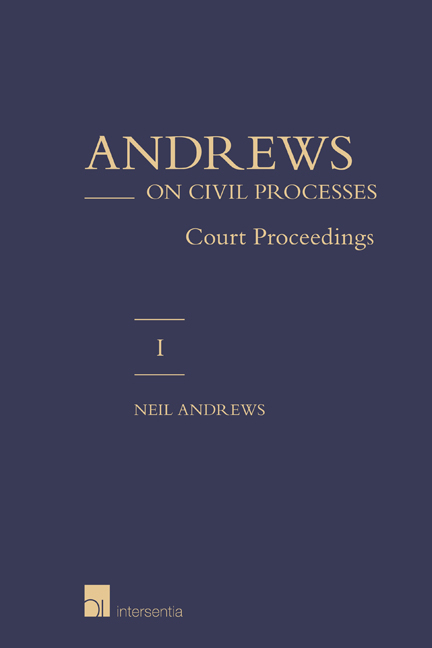Book contents
- Frontmatter
- Dedication
- Epigraph
- Preface
- Contents
- Table of Cases
- Table of Statutes
- Table of Statutory Instruments
- PART I INTRODUCTION TO THE FORMS OF CIVIL JUSTICE
- PART II COMMENCEMENT OF COURT PROCEEDINGS AND PREPARATION FOR TRIAL
- Chapter 4 The Six Phases of Court Proceedings
- Chapter 5 Commencement and Service
- Chapter 6 Pleadings and Parties
- Chapter 7 Counterclaims and Set-Off
- Chapter 8 Limitation of Actions
- Chapter 9 Case Management and Procedural Discipline
- Chapter 10 Pre-Trial Termination of Actions Without Settlement: Interim, Summary, Default, Preliminary and Striking Out Procedures
- Chapter 11 Disclosure
- Chapter 12 Privileges
- Chapter 13 Experts
- PART III END-GAME: TRIAL, APPEAL, FINALITY AND ENFORCEMENT
- PART IV COSTS AND FINANCING OF LITIGATION
- PART V SPECIAL PROCEEDINGS
- PART VI PRINCIPLES OF CIVIL LITIGATION
- PART VII THE EUROPEAN CONTEXT
- Select Bibliography
- Index to Volumes I and II
Chapter 5 - Commencement and Service
from PART II - COMMENCEMENT OF COURT PROCEEDINGS AND PREPARATION FOR TRIAL
Published online by Cambridge University Press: 13 December 2017
- Frontmatter
- Dedication
- Epigraph
- Preface
- Contents
- Table of Cases
- Table of Statutes
- Table of Statutory Instruments
- PART I INTRODUCTION TO THE FORMS OF CIVIL JUSTICE
- PART II COMMENCEMENT OF COURT PROCEEDINGS AND PREPARATION FOR TRIAL
- Chapter 4 The Six Phases of Court Proceedings
- Chapter 5 Commencement and Service
- Chapter 6 Pleadings and Parties
- Chapter 7 Counterclaims and Set-Off
- Chapter 8 Limitation of Actions
- Chapter 9 Case Management and Procedural Discipline
- Chapter 10 Pre-Trial Termination of Actions Without Settlement: Interim, Summary, Default, Preliminary and Striking Out Procedures
- Chapter 11 Disclosure
- Chapter 12 Privileges
- Chapter 13 Experts
- PART III END-GAME: TRIAL, APPEAL, FINALITY AND ENFORCEMENT
- PART IV COSTS AND FINANCING OF LITIGATION
- PART V SPECIAL PROCEEDINGS
- PART VI PRINCIPLES OF CIVIL LITIGATION
- PART VII THE EUROPEAN CONTEXT
- Select Bibliography
- Index to Volumes I and II
Summary
INTRODUCTION
This chapter concerns the first two stepping-stones for the opening formal stages of the case: (i) issue of the originating process (a document formerly known, within the pre-CPR High Court practice, as a ‘writ’, but now known, both in the County Courts and High Court, as a ‘claim form’); and (ii) service of the claim form on the defendant. As noted at 4.01, the pre-action stage is a precursor to commencement of formal proceedings.
PRE-ACTION PROTOCOLS
ISSUE OF THE CLAIM FORM
Under the CPR the main form of commencement is by issue of a ‘claim form’. The rules preserve the claimant's right to elect to include the particulars of claim in the claim form or whether to serve these later, within 14 days of service of the claim. Accompanying the particulars of claim, the claimant must serve ‘response pack’ forms enabling the defendant to defend the claim or to admit the claim, and to acknowledge service. The claimant's failure to use the correct form when commencing process will not be fatal. In Adams v. Ford (2012) the Court of Appeal held that a claim form was not a nullity even though the claimants’ solicitor's statement of truth was deliberately false because it contained names of claimants who had not in fact authorised the relevant solicitor to issue proceedings on their behalf. In this case a large collection of claimants had been bundled together in a single claim form. Proceedings had been issued in a rush in order to beat the limitation deadline. It would have been better for the claimants’ solicitors to have made clear which clients had authorised proceedings. But it would be disproportionate to strike out the amended claim form, in which the truly authorised set of claimants was now properly listed.
DATE OF COMMENCEMENT OF PROCEEDINGS
The time of commencement of civil proceedings is the date entered by the court on the claim form. For limitation purposes, a claim is ‘brought’ as soon as the claim form is ‘received in the court office’.
PART 8 PROCEDURE
A ‘Part 8 procedure’ replaces the originating summons. This mode of commencement is used where the claimant seeks ‘the court's decision on a question which is unlikely to involve a substantial dispute of fact’.
- Type
- Chapter
- Information
- Andrews on Civil ProcessesCourt Proceedings, pp. 75 - 96Publisher: IntersentiaPrint publication year: 2013



